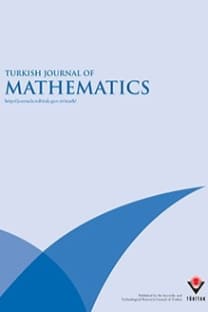A Generalization of Ankeny and Rivlin's Result on the Maximum Modulus of Polynomials not Vanishing in the Interior of the Unit Circle
Polynomial, maximum modulus principle, not vanishing in the interior of unit circle, generalization, sth derivative
A Generalization of Ankeny and Rivlin's Result on the Maximum Modulus of Polynomials not Vanishing in the Interior of the Unit Circle
Polynomial, maximum modulus principle, not vanishing in the interior of unit circle, generalization, sth derivative,
- ISSN: 1300-0098
- Yayın Aralığı: 6
- Yayıncı: TÜBİTAK
Uniqueness of Coprimary Decompositions
Spectral Problems for Operator Pencils in Non-Separated Root Zones
Traces of Maximal Ideals of Topological Algebras in Their Subalgebras
Estimates for Fourier Transform of Measures Supported on Singular Hypersurfaces
Slant submanifolds of Kaehler Product Manifolds
Relations Among Algebraic Models of 1-Connected Homotopy 3-Types
